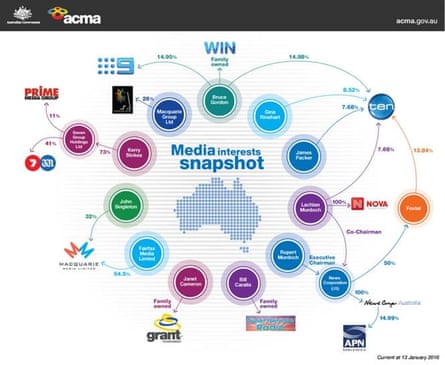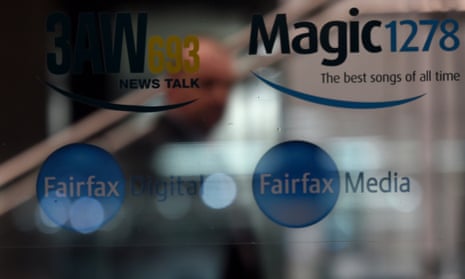The federal government is drafting legislation to overhaul the nation’s pre-internet media laws which may open the way for media mergers between TV, newspaper and radio companies.
Cabinet has approved the abolition of the so-called two out of three rule, which prevented media from owning radio, TV and newspapers in a single market to prevent concentration of media and ensure a diversity of voices.
If approved by parliament the change would, for example, allow News Corp Australia to buy Channel Ten and Foxtel or Fairfax Media to merge with Channel Nine.
Under the current laws, which were drafted by the Keating government 24 years ago, Fairfax cannot merge with Nine because it has already joined forces with Macquarie Media which owns radio stations 2UE and 2GB.

The so-called reach rule – which restricted any one media company from broadcasting to more than 75% of the country – has also been dumped.
The reach rule has been made redundant by internet streaming, which has allowed the free-to-air networks to live stream their programming across the country, bypassing regional broadcasters.
The package is believed to include measures to protect local content in regional areas.
However, the government has stopped short of approving changes to the anti-siphoning regime – which gives free-to-air TV the first right to bid for broadcasting rights for many sporting events.
The regime ensures big sporting events like the rugby league grand final are kept free for the public and not available only to those with subscription television.
The failure to move on anti-siphoning has angered Foxtel, which is half-owned by News Corp, as it is under pressure from internet streaming services and sport is the main driver of subscriptions.
The executive chairman of News Corp Australasia, Michael Miller, said the package could not be called genuine media reform.
“We are disappointed that, despite the broad recognition that Australia’s media laws are outdated, the government is proposing that only the reach and two out of three rules be changed,” Miller said.
“The fact that broader media reform issues such as the anti-siphoning regime are not part of the proposal makes it difficult to accept this as genuine media reform.
“It will be even more disappointing if at the end of the process only minimal changes were achieved.”
The chief executive of the Seven network, Tim Worner, also slammed the package as “piecemeal reform”.
“It’s hard to know what these changes will actually deliver to ordinary Australians,” Worner said.
“And very difficult to support this proposal in the absence of any moves to address the regulatory constraints that are jeopardising the future of Australian free-to-air broadcasting, particularly licence fees.”
Under the present regime the commercial free-to-air networks Nine, Seven and Ten all have to pay multimillion dollar license fees to the government which they argue is unfair now that digital disruption has challenged their business model.
The communications minister, Mitch Fifield, who is yet to publicly announce the policy, said he wanted to introduce legislation as soon as possible.
“I’m aiming to not let the grass grow on media reform,” Fifield told the ABC’s Lateline.
“There is the opportunity to bring Australia’s media laws into the 21st century to make sure that they reflect not the analogue world, but to capture and cater for the world that we live in today.”
Labor’s communications spokesman, Jason Clare, had a mixed response to the package, supporting abolishing the reach rule but not the the two out of three rule.
“I’ve heard strong arguments in favour of keeping it but also strong arguments in favour of removing it,” Clare said.
Fairfax welcomed the package. “Fairfax has consistently supported media law reform and welcomes cabinet’s decision to remove outdated restrictions in the present legislation,” a spokesman said.
Nine declined to comment.

Comments (…)
Sign in or create your Guardian account to join the discussion